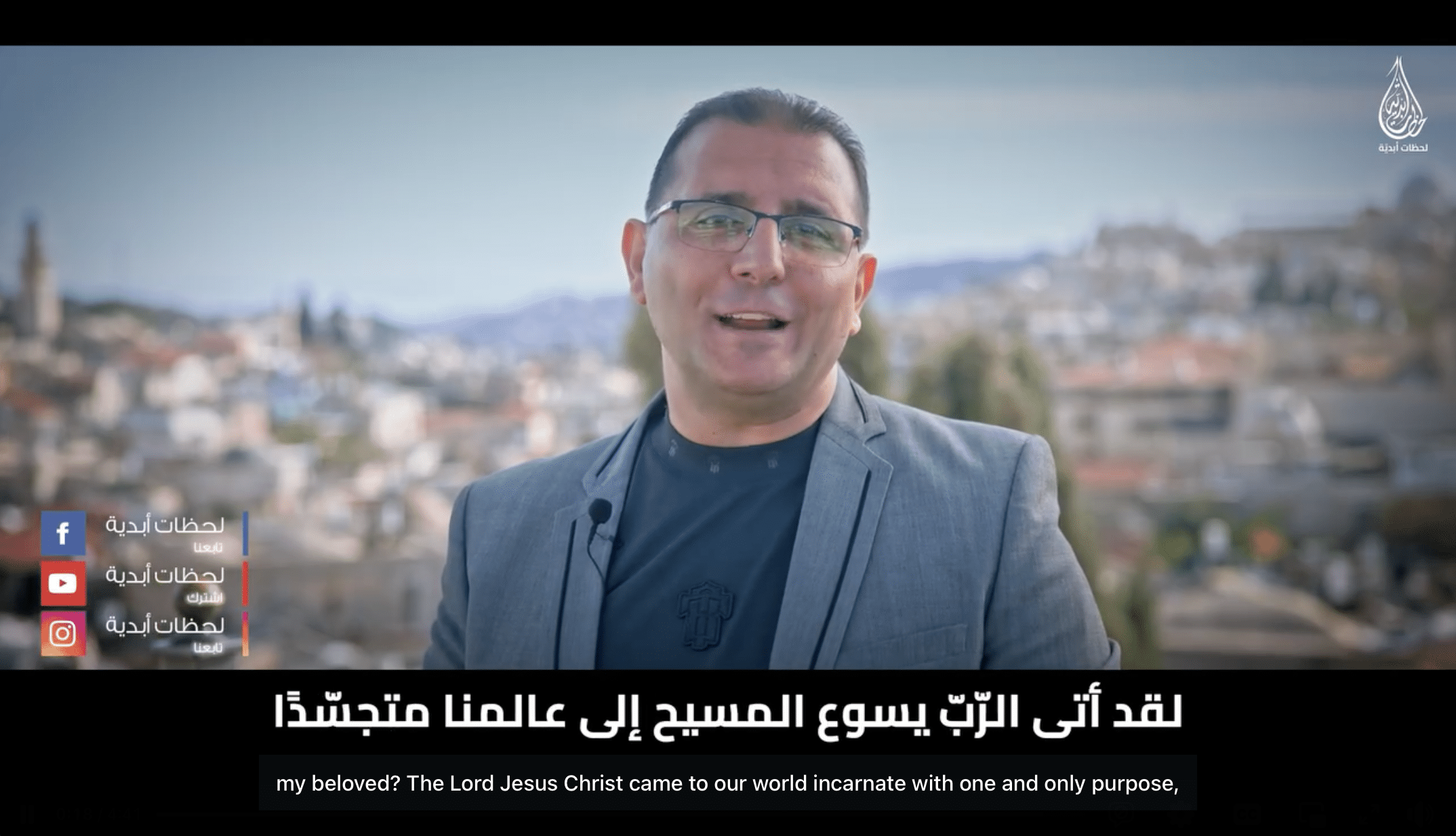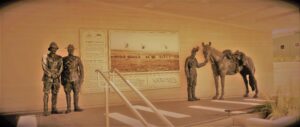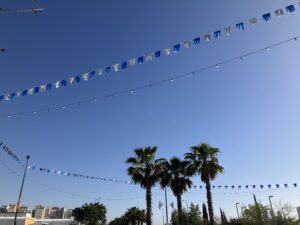It’s Christmakkah! Occasionally, Hanukkah and Christmas collide. Many think of these holidays like oil and water—from two completely different faith traditions that cannot be mixed. Many who celebrate Hanukkah, even if they love Jesus, will struggle with Christmas. Similarly, many Christians mistakenly think Hanukkah has nothing to do with them. But there is a common denominator to these holidays, as you might have already guessed.
It’s Jesus who makes the powerful connection between Christmas and Hanukkah, and also between Hanukkah and Sukkot, but we’ll get to that in a minute.
Room for everyone
 Unlike the nativity story where there was no room at the inn, there’s plenty of room for all God’s children and His arms are open wide to those who light candles as well as those who decorate trees.
Unlike the nativity story where there was no room at the inn, there’s plenty of room for all God’s children and His arms are open wide to those who light candles as well as those who decorate trees.
This is something we’ve got used to here at ONE FOR ISRAEL. As a team of Jewish and Arab believers, with our Bible college training both Arab and Jewish students, we’ve learned to embrace one another’s traditions and enjoy the special time together. It hasn’t always been a smooth ride, as for some Messianic Jewish believers the whole idea of Christmas ruffles feathers and causes discomfort. Similarly, some Christian Arabs struggle to understand why Jewish believers aren’t more excited about the birth of Jesus and the entirely biblical story of His first coming. Over the years we have grown to accept and embrace all these expressions of our love for Jesus and the faith that joins us to be one new man in Him.
Christmas is a fantastic time to share the truth about Jesus with those who don’t know Him, and in these dark days it’s important to make the most of every opportunity as the Bible encourages us. Churches around the world will be busy each December, and we are also maximizing the reason for the season! It’s true that we might not know the exact date of the Messiah’s birth, but we can still celebrate His coming.
Making the most of every opportunity
This year our Arabic outreach team is releasing five festive music videos based on biblical prophecies about the Messiah, with a short evangelistic explanation about how Jesus fulfills each one. These videos are all in Arabic, and intended to reach everyone who speaks Arabic both in Israel and beyond! Over 70% of our followers are from Muslim countries outside of Israel. Here are the prophetic messages of the five music videos about our Savior’s birth:
1. يا عجيب يا مشير Wonderful, counselor, mighty God
מבוסס על ישעיה ט׳ 6, יש בו הצהרה שישוע הוא אלוהים שבא בבשר ונותנים לו את הכבוד וחוגגים את בואו- שיר עם הרבה שמחה
Based on Isaiah 9:6, we explain that Jesus is God who has come in the flesh, and give Him glory by celebrating His coming with songs of great joy!
2. مسيحي للأرض جيت My Messiah, you came to earth
מדבר על המשיח שהגיע לעולם, שהתהלך ביננו ושאי אפשר להסיט את העיניים ממנו מרוב שהוא נפלא!
We speak of the Messiah who came to the world, who walked among us and how we cannot stop gazing at how wonderful He is.
3. في البدء كان الكلمة In the beginning was the Word
מבוסס על יוחנן פרק א׳ שישוע הוא הדבר ושהכל נהיה על ידיו.
Based on John 1, we speak of how Jesus is the Word of God and that everything was made by and for Him.
4. ولد المسيح + في كل عيد ميلاد The Messiah is born + In every Christmas
מדבר על כך שישוע נולד הללויה , שיר שחוזר על עצמו בהצהרה כי המשיח נולד, והשני מדבר על איחולי ברכה לשנה חדשה וחג מולד שמח
We speak of how Jesus was born—hallelujah! One song declares the Messiah’s birth, the other wishes everyone Merry Christmas and a happy new year.
5. سنين طويلة مضت Many years have passed
מדבר על דאגת האדון לנו במשך השנים, ושהוא מחזיק אותנו בזרועותיו הנצחיות שיר ארוך שמהלל את האדון ומודה לו על טובו ונאמנותו בכל שנות חיינו
We speak of the Lord’s care for us throughout the years, and that He holds us in His everlasting arms. It’s a long song that praises the Lord and thanks Him for His goodness and faithfulness throughout all the years of our lives.
The link between Hanukkah and Sukkot
And there is a great deal of biblical depth to Hanukkah that’s worth exploring for all who love the word of God as well. Let’s go on a dive right now into the connections between Sukkot, the Feast of Tabernacles mentioned in the Law of Moses, and Hanukkah, the Feast of Dedication, mentioned in John 10:22. Even though Sukkot is in the Autumn and Hanukkah usually falls in December, there are a number of links we should notice.
The first, obvious point is that Hanukkah (which means dedication) and Sukkot (which means tabernacles or shelters) are both eight days long. Seven signifies completion, and eight eternity. Both Hanukkah and Sukkot are simultaneously seven and eight days in length and significance. What? Yes. The Hanukkah miracle, according to legend, is that one day’s oil lasted for eight days but think about it, it’s not a miracle for a day’s oil to last a day. The first day wasn’t a miracle at all. It’s the seven days after that which would be miraculous. Similarly, Sukkot is a week-long feast, but in the very passage that dictates there are seven days of Sukkot, we see God also mandating the eighth day:
“For seven days you are to bring an offering by fire to Adonai. The eighth day will be a holy convocation to you, and you are to bring an offering by fire to Adonai. It is a solemn assembly—you should do no laborious work.” (Leviticus 23:36)
The number seven and seventh crops up over and over again multiple times in the instructions regarding Sukkot, but the number eight also has significance, as it points to eternity: the time when God and man will tabernacle together forever.
Hanukkah is an eight-day long feast of dedication after cleansing from defilement, based on the eight-day feast of Sukkot.
The apocryphal book of Maccabees tells us the story of how Hanukkah (which means dedication) began in 167 BC when the Jewish Maccabees overthrew the Greeks who had filled the temple with Greek gods. Here’s a short passage from the story:
“They rededicated the Temple on the twenty-fifth day of the month of Kislev, the same day of the same month on which the Temple had been desecrated by the Gentiles. The happy celebration lasted eight days, like the Festival of Shelters, and the people remembered that, only a short time before, they had spent the Festival of Shelters wandering like wild animals in the mountains and living in caves. But now, carrying green palm branches and sticks decorated with ivy, they paraded around, singing grateful praises to him who had brought about the purification of his own Temple. Everyone agreed that the entire Jewish nation should celebrate this festival each year.” (2 Maccabees 10:5-8)
It’s twice now that Israel, after suffering devastating losses, recovers all and marks the moment of rededicating the temple by celebrating Sukkot, the Feast of Shelters, even though it was way past the date. The first time Sukkot was celebrated late was when Nehemiah and co rebuilt the ruins of Jerusalem and on the completion of the temple felt there was no better dedication ceremony imaginable than the eight-day Feast of Tabernacles.
Prepare Him room
So Hanukkah, the Jewish Feast of Dedication, goes all the way back to this particular celebration of Sukkot in Nehemiah’s day, held at an unusual time of year, in order to consecrate and dedicate the second temple – and the people themselves. And the purity of the oil for the temple menorah is a key part of the Hanukkah story.
It was winter, and the Festival of the Dedication of the Temple was being celebrated in Jerusalem. Jesus was walking in Solomon’s Porch in the Temple, when the people gathered around him and asked, “How long are you going to keep us in suspense? Tell us the plain truth: are you the Messiah?” (John 10:22-24)
The Messiah came just as the prophets promised.
Let us clean out the temple of our lives, rededicate ourselves to Him, and prepare Him room in our hearts.
The Messiah came in the flesh, just as the prophets said they would, by a miraculous virgin birth, and the Hanukkah message of dedicating His house, preparing His place for holy purposes helps us to remember this season not just about cakes and presents. God coming to dwell with man is an awesome and holy business. He came to bring joy to the earth and peace among men.
Jew and Gentile united in Messiah
Hanukkah and Christmas will both land on December 25 this year, almost prophetically speaking of the union between Jew and Gentile. This is a union made in the Messiah, the Prince of Peace. Here’s how Paul puts it in Ephesians:
“For he himself is our peace, who has made us both one and has broken down in his flesh the dividing wall of hostility by abolishing the law of commandments expressed in ordinances, that he might create in himself one new man in place of the two, so making peace, and might reconcile us both to God in one body through the cross, thereby killing the hostility. And he came and preached peace to you who were far off and peace to those who were near. For through him we both have access in one Spirit to the Father. So then you are no longer strangers and aliens, but you are fellow citizens with the saints and members of the household of God, built on the foundation of the apostles and prophets, Christ Jesus himself being the cornerstone, in whom the whole structure, being joined together, grows into a holy temple in the Lord. In him you also are being built together into a dwelling place for God by the Spirit. (Ephesians 2:14-22)
This structure Paul speaks of, this temple with the cornerstone being Jesus, is us! We are now the temple of God, the dwelling place of His Spirit (see also 1 Corinthians 6:19-20, 2 Corinthians 6:16).
We are the temple that has been purified and now the light of God can live in us. The temple menorah, of course, represents Jesus.
The reason for the season, whether you’re talking about Christmas, Hanukkah, or even Sukkot, is Jesus.
And the angel who talked with me came again and woke me, like a man who is awakened out of his sleep. And he said to me, “What do you see?” I said, “I see, and behold, a lampstand all of gold, with a bowl on the top of it, and seven lamps on it, with seven lips on each of the lamps that are on the top of it. And there are two olive trees by it, one on the right of the bowl and the other on its left.” And I said to the angel who talked with me, “What are these, my lord?” Then the angel who talked with me answered and said to me, “Do you not know what these are?” I said, “No, my lord.” Then he said to me, “This is the word of the Lord to Zerubbabel: Not by might, nor by power, but by my Spirit, says the Lord of hosts.” (Zechariah 4:1-6)
This picture of two olive trees is linked to Pauls words in Romans 11 about Jewish and Gentile believers. Zechariah’s message is packed full of symbolism with oil, trees, and light. The message is a reminder that God is the One who accomplishes our salvation, our purification, and our unity with one another.
And would you look at that: there’s a menorah bang in the middle of the scene.
From our Jewish and Arab team united in the Messiah, we wish you Merry Christmakkah and a happy new year!
Photo by Francisco Moreno on Unsplash

















